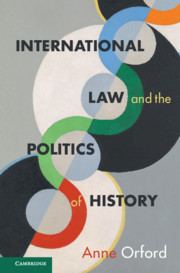Book contents
- International Law and the Politics of History
- International Law and the Politics of History
- Copyright page
- Contents
- Acknowledgements
- 1 Neoformalism and the Turn to History in International Law
- 2 Situating the Turn to History in International Law
- 3 History and the Turn to the International
- 4 History’s Lawyers
- 5 The Past in the Practice of International Law
- 6 The History of What?
- 7 Why Study the Past of International Law?
- Bibliography
- Index
5 - The Past in the Practice of International Law
Published online by Cambridge University Press: 18 June 2021
- International Law and the Politics of History
- International Law and the Politics of History
- Copyright page
- Contents
- Acknowledgements
- 1 Neoformalism and the Turn to History in International Law
- 2 Situating the Turn to History in International Law
- 3 History and the Turn to the International
- 4 History’s Lawyers
- 5 The Past in the Practice of International Law
- 6 The History of What?
- 7 Why Study the Past of International Law?
- Bibliography
- Index
Summary
This chapter challenges the representations of international law that dominate the turn to history. The vision of international law as metaphysically grounded and of lawyers as scholastics or moralising judges is resonant because it shores up a familiar fantasy. Yet that vision bears little relation to the ways in which contemporary international lawyers use the past in the practice of making legal arguments. This chapter explores the indeterminacy and capaciousness of the past materials out of which international legal arguments are assembled and the varied roles lawyers are trained to adopt in making such arguments. It shows that international lawyers are already immersed in a centuries-long debate over the grounds of law’s authority, into which historicising techniques and anti-metaphysical approaches have long been incorporated. Many influential forms of international legal thought, including legal realism, positivism, critical legal studies, and game theory, have been informed by an anti-metaphysical orientation. Far from being a revolutionary insight, the claim that historicising a text can settle its meaning is just one of many claims that are already part of the broader argumentative world of international lawyers, and no more likely than any other to resolve interpretative controversies or offer the truth of legal history.
Keywords
- Type
- Chapter
- Information
- International Law and the Politics of History , pp. 178 - 252Publisher: Cambridge University PressPrint publication year: 2021

